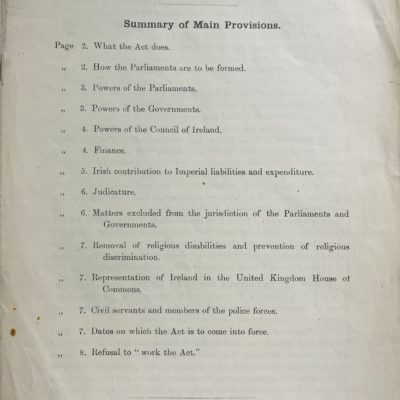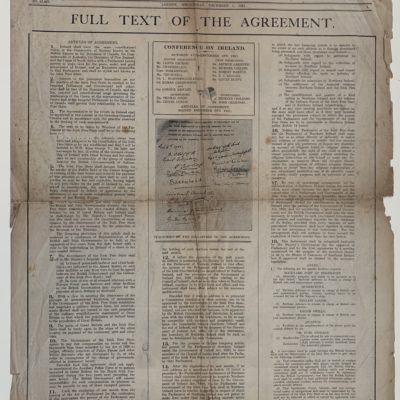Timeline of Local and National Events 1921
National events in blue
Local events in black
January 1921
7th
The USC conducts a major search operation across many parts of Tyrone. From the beginning of the year A and B Specials are increasingly deployed in Tyrone and Fermanagh in support of the RIC.
11th
Collins states that Sinn Féin should contest the forthcoming elections for the Northern Ireland Parliament but should ‘ignore the Partition Act’.
25th
Carson announces that he will not become the first Prime Minister of the new Northern Ireland state.
26th
The IRA shoots dead two RIC officers in a Belfast hotel.
28th
In the Dripsey ambush, Co. Cork, 2 Volunteers are killed, 5 are wounded and a further 5 are captured. Acting on information supplied by Mrs Mary Lindsay the Crown Forces were expecting the attack. The five prisoners are later executed following a court-martial.
February 1921
4th
In his final speech as leader Carson calls on the new parliament to demonstrate that ‘the Catholic minority have nothing to fear from a Protestant majority.
4th
Sir James Craig becomes Unionist Party leader.
Creative Centenaries – James Craig appointed new leader of Ulster Unionists
15th
The IRA lose 3 Volunteers, and 8 civilians are killed when a passenger train is ambushed at Upton, Co. Cork. There are more soldiers on the train than anticipated, and the attack is widely condemned.
20th
Crown Forces attack a farmhouse at Clonmult in which an active service unit is hiding. The IRA suffers 12 fatalities in the exchange, the biggest loss experienced by the Cork IRA.
22nd
The shooting of George Lester, a local Loyalist, in Roslea leads to savage reprisals against the village’s Catholic population. Over 20 thatched cottages are destroyed by fire.
March 1921
4th
An IRA ambush near Carrick-on-Shannon, Co. Leitrim, results in the death of 1 soldier and the wounding of several others.
9th
Mrs Lindsay and her driver, James Clarke, who had been seized in an attempt to force the release of the 5 Volunteers captured at Dripsey, are executed by the Cork IRA.
10th
Speaking in the House of Commons, Joe Devlin urges the government to postpone the elections for the Belfast parliament.
11th
Acting on information, soldiers surround an IRA safe house near Mohill, Co. Leitrim. In the ensuing gun battle 6 Volunteers are killed including their leader, Sean Connolly, a Co. Longford native.
17th
Andrew Bonar Law, a powerful supporter of Ulster
Unionism, resigns from the government.
19th
The largest military engagement of the War of Independence takes place at Crossbarry, Co. Cork, as a large force of British troops surround members of Tom Barry’s flying column. In what was viewed as a significant victory for the IRA Barry’s men manage to escape and inflict heavy casualties on the British.
21st
In retaliation for the attacks on Catholic homes in Roslea 2 Loyalists are shot dead close to the village.
29th
The Fleming family of large Protestant farmers is attacked in Co. Monaghan in revenge for the earlier death of a Volunteer. Both the father and his son are killed.
30th
Barry’s men attack the RIC Barracks in his home town of Rosscarberry. High explosives are used to force a surrender.
30th
William Latimer, a local Protestant farmer and Orangeman suspected of informing the RIC on the location of the IRA unit at Selton Hill near Mohill, is shot dead.
April 1921
5th
The IRA launches simultaneous attacks across Tyrone. Two Specials are wounded in Drumquin and one in Dromore.
6th
Following a shooting in Dromore in which a Special
Constable was wounded 3 Volunteers, Charles Slevin, John Devine and Daniel Doherty, are shot dead by the USC outside the village.
17th
Following robust searches of local properties a Special is shot and wounded in Dromore.
23rd
Two Black and Tans are shot dead in Belfast city centre, prompting reprisal attacks on the Catholic population.
27th
Lord Fitzalan is appointed Lord Lieutenant of Ireland. He is the first Catholic to hold the post since 1685.
May 1921
2nd
Craig opens the election campaign for the new Belfast parliament with a speech in Banbridge.
3rd

Partition comes into effect under the terms of the Government of Ireland Act.
3rd
An IRA ambush in Tourmakeady, Co. Mayo, claims the lives of 4 policemen and a military officer. Two Volunteers die in the gun battle.
5th
Craig meets de Valera at a secret location in Dublin.
5th
The IRA stages an attack on Mountfield Barracks.
15th
An IRA ambush in Esker leaves a Special Constable and a Volunteer dead.
18th
Loyalists occupy the Ulster Hall in Belfast to prevent a key Labour meeting taking place. Craig welcomes the action, describing the Labour leaders as Bolsheviks.
20th
Joseph Hayden is murdered in his home at Gortfad Glebe near Cookstown. Local B Specials are suspected of involvement in the attack.
22nd
Bishop MacRory (Down and Connor) issues a call for the support of all candidates in the election who oppose partition.
22nd
Peter Joseph McDonagh, a sergeant based at Mountfield Barracks, is killed in Greencastle.
24th
In the Northern Ireland election the Unionists win 40 seats, Nationalists win 6 and Sinn Féin win 6.
24th
The 8 successful candidates in the Fermanagh and Tyrone constituency are Arthur Griffith (SF), Sean Milroy (SF), Sean O’Mahony (SF), T.J.S. Harbison (Nat), Edward Archdale (Un), William Coote (Un), William Miller (Un) and James Cooper (Un).
25th
An IRA attack on the Custom House in Dublin causes extensive damage. The action, which de Valera had encouraged, attracted international press coverage, but was a military setback for the IRA as nearly 100 Volunteers were captured.
30th
Two B Specials are killed in an ambush at Mullaghfad near Fivemiletown.
June 1921
1st
William Coote calls for the shooting of 3 Sinn Féiners for each USC constable that is shot.
7th
Craig is appointed Prime Minister of Northern Ireland.
11th
The shooting of 3 RIC officers in Belfast sparks savage violence in the city which leaves 14 dead and 76 wounded by the end of the month.
12th
Rev James Finlay, an elderly, retired Church of Ireland clergyman, is shot dead at Bawnboy, Co. Cavan.
22nd
George V opens the Northern Ireland parliament amid tight security. In his speech the King asks all Irishmen ‘to pause, to stretch out the hand of forebearance and conciliation’.
30th
Arthur Griffith is released from Mountjoy Jail.
July 1921
5th
General Jan Smuts, the South African leader, who had contributed to the King’s Speech, meets de Valera in Dublin.
6th
A goods train travelling to Omagh is intercepted by a large force of Volunteers who destroy 16 waggons. Omagh is left without its usual bread supply.
8th
Sinn Féin accepts Lloyd George’s invitation to explore the possibility of a settlement.
10th
On ‘Bloody Sunday’ 15 are killed and over 100 homes are destroyed as Loyalist mobs invade Catholic areas of Belfast.
11th
The truce ending hostilities in the War of Independence comes into operation.
14th
De Valera arrives in London for a series of meetings with Lloyd George.
20th
The British government offers de Valera dominion status for Ireland.
21st
Com. Eoin O’Duffy, the IRA’s new Liaison Officer in
Ulster, issues a statement detailing nightly breaches of the truce due to ‘incessant firing’ by the USC in Tyrone and Fermanagh.
August 1921
10th
De Valera finally announces the rejection of the British offer of dominion status.
15th
T.J.S. Harbinson (MP) addresses Tyrone Hibernians warning that nationalists in Tyrone and Fermanagh will never consent to be placed under ‘the most bigoted class of fanatics the world had ever seen’.
29th
Serious violence again erupts in parts of north and west Belfast leading to 20 deaths over a 3-day period.
30th
De Valera meets a delegation from Tyrone and Fermanagh, urging the President to protect their interests.
September 1921
4th
Michael Collins visits Armagh in attempt to reassure
northern nationalists. In his address to 10,000 supporters he insists that partition must be ended. At the same meeting O’Duffy warns Unionists that if they refuse to give way, they will be coerced.
5th
Tempers are raised during a stormy meeting of Omagh Urban Council as councillors support an anti-partition motion.
10th
Circulars are distributed to many Enniskillen Catholic families warning them not to trade with certain businesses as the boycott is reinforced.
29th
Lloyd George and de Valera agree terms for a conference.
October 1921
11th
The conference opens in London with Sinn Féin and British government negotiators seeking to agree a settlement.
15th
Sean Milroy, a Sinn Féin representative for Fermanagh and Tyrone, travels to London to advise the Irish delegation on the partition issue. Milroy, who had little knowledge of Ulster, defers to George Murnaghan, the Omagh solicitor, on the question of Tyrone and Fermanagh.
30th
Both The Sunday Times and The Observer insist that Craig and his new administration must make concessions in order to improve the prospects of a peace settlement with Sinn Féin.
31st
Austen Chamberlain, the Conservative leader and a key player in the negotiations, confides that partition is impossible to defend: ‘the Six Counties was a compromise, and, like all compromises, is illogical and indefensible’.
November 1921
5th
Lloyd George meets Craig in London and puts pressure on the North’s premier to accept an all-Ireland parliament. Following consultation with Bonar Law, Craig stands firm.
13th
A large nationalist meeting in Enniskillen’s County Hall hears Darrell Figgis, a leading Sinn Féiner, condemn partition.
19th
Serious violence again breaks out in Belfast. During the following week 27 die in sectarian clashes.
22nd
Security powers are transferred to the Unionist government in Belfast.
28th
Tyrone County Council transfers its allegiance to Dáil Éireann.
December 1921
2nd
The police raid Omagh Courthouse, where most of the county’s administrative services are housed, and suspend Tyrone County Council.
6th

The Anglo-Irish Treaty is signed in the early hours of the morning. Article 12 makes provision for the establishment of a Boundary Commission.
10th
The Herald newspapers in Tyrone and Fermanagh welcome the Treaty under the headline, ‘Victory!’.
14th
The Dáil begins to debate the Treaty, recessing for Christmas.
25th
Bishop MacRory declares his support for the Treaty in a Christmas Day sermon.
27th
A major nationalist meeting in Omagh indicates strong support for the Treaty in Tyrone.


